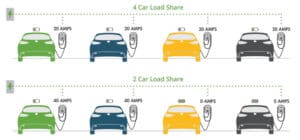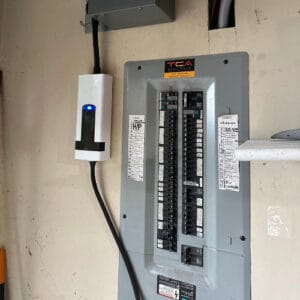Load-Sharing EV Chargers: Do I Need a Load Management System for My EV Charger?
As electric vehicles (EVs) become more popular, the demand for home EV chargers has increased. But before installing a charger in your home, you may need to consider whether your electrical system can handle the added load. A load management system for your EV charger—also known as load-sharing EV chargers—may be the perfect solution to ensure your home’s electrical system remains safe and efficient. Learn more about our load-sharing EV chargers, which are available through TCA Electric in Vancouver, BC.

What Is a Load Management System?
A load management system allows your home’s electrical system to distribute power evenly between your EV charger and other appliances. This system ensures that your EV charger doesn’t overload your home’s electrical capacity, preventing potential issues such as tripped breakers or the need for expensive electrical upgrades.
When multiple high-power devices, like your electric vehicle charger, HVAC system, or kitchen appliances, are running simultaneously, a load management system automatically regulates the amount of power each device receives. This process is known as load sharing.
Benefits of Load-Sharing EV Chargers
If your home’s electrical system is not equipped to handle the full power requirements of an EV charger, you may be faced with the prospect of upgrading your electrical panel or service. This can be costly and time-consuming. A load-sharing EV charger allows you to bypass this by distributing power more effectively, reducing the strain on your system without the need for major electrical work.
Energy Efficiency
A load management system not only protects your home’s electrical system but also increases energy efficiency. By ensuring that no one device consumes more power than necessary, your home operates more efficiently, saving on energy costs over time.
Increased Safety
Safety is a major concern when adding any new high-power device to your home. A load-sharing EV charger helps prevent overloading and overheating of your home’s electrical system. This reduces the risk of electrical fires or damage to your appliances.
Maximized Charging Speed
Load-sharing systems dynamically adjust the power allocation to your EV charger based on the energy demand of other devices. During periods of low energy use, more power is sent to your EV charger, resulting in faster charging times. This ensures you get the most efficient charging without compromising the safety or functionality of your home’s electrical system.
Do I Need a Load Management System for My EV Charger?

The need for a load-sharing EV charger depends on several factors:
- Home Electrical Capacity: Older homes or homes with lower electrical capacity may struggle to support a high-powered EV charger without load sharing.
- Multiple Devices: If you have several high-power appliances that run simultaneously, a load management system ensures that each receives the necessary power without overloading the system.
-
-
-
-
-
- Future-Proofing: As you add more electrical devices to your home, having a load management system can help accommodate the increased demand without requiring frequent electrical upgrades.
-
-
-
-
-
If you’re unsure whether you need a load-sharing EV charger, our experts at TCA Electric in Vancouver can assess your home’s electrical system and recommend the best solution for your EV charging needs.
Check out our interview with North Shore News on this topic.
Contact TCA Electric Today!
Installing an EV charger at home can be a great convenience, but it’s essential to ensure your electrical system can handle the additional load. A load management system for your EV charger offers a safe, efficient, and cost-effective way to charge your vehicle without overloading your home’s power supply.
Contact TCA Electric today to learn more about load-sharing EV chargers and how they can benefit your Vancouver home.



